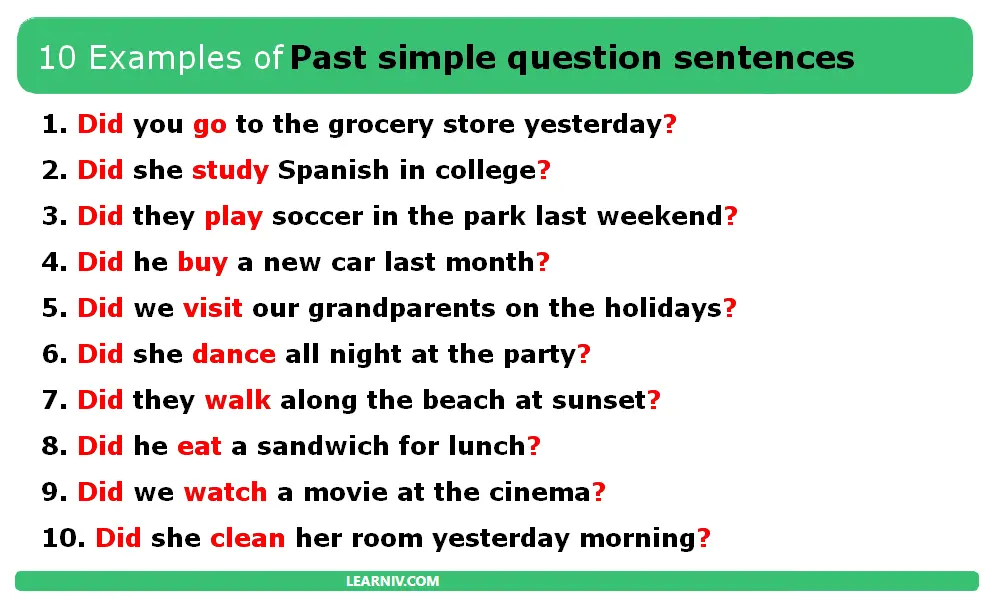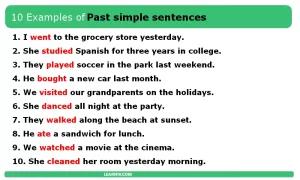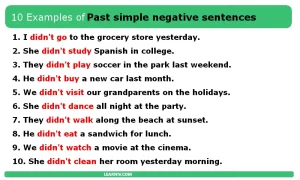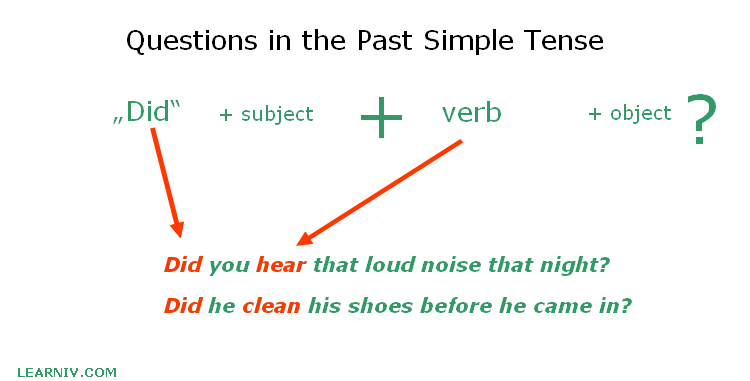
Past simple interrogative sentences
Here are ten examples of interrogative sentences (questions) in the simple past tense:
1. Did you go to the grocery store yesterday?
2. Did she study Spanish in college?
3. Did they play soccer in the park last weekend?
4. Did he buy a new car last month?
5. Did we visit our grandparents on the holidays?
6. Did she dance all night at the party?
7. Did they walk along the beach at sunset?
8. Did he eat a sandwich for lunch?
9. Did we watch a movie at the cinema?
10. Did she clean her room yesterday morning?
More examples of Past simple sentences
About Past Simple tense and it´s interrogative form
To form a question in the past simple we need to use an auxiliary verb „did“ in front of the subject and the base form of the verb. „Did“ is the affirmative meaning of the verb „did not/didn’t“. „Did“ is also the 2nd form (past tense form) of the irregular verb „do“.
The complete sentence would be as follows:
Did + subject + base form of verb + object ?
The past simple tense in English is commonly used to describe completed actions, events, and situations that occurred in the past. In the form of a question, we use the auxiliary verb “did” to indicate that we are asking about something that happened in the past. For example, we might use the past simple to ask about actions that occurred in the past, such as “Did you go to the party last night?” or “Did she finish her homework on time?” We might also use the past simple to ask about events or situations that occurred in the past, such as “Did it rain yesterday?” or “Did the store open on time?” In addition, the past simple can be used to ask about habits or traits that were present in the past, such as “Did he smoke when he was younger?” or “Did you know how to swim when you were younger?” By using question sentences in the past simple tense, we can gather information about past events and situations, and express ideas in a clear and concise manner.
What the interrogative sentence means
The term “interrogative” refers to a grammatical category used to form questions in a sentence. Interrogative sentences are used to seek information, clarification, or to express curiosity. These sentences are characterized by their inverted word order or the presence of a question word (such as who, what, where, when, why, how) at the beginning of the sentence.
The main difference between interrogative, negative, and affirmative sentences lies in their purpose and structure:
- Interrogative Sentences: These sentences are used to ask questions and seek information. They typically require a response from the listener or reader. Interrogative sentences can have different word orders depending on the language, but they often involve subject-verb inversion or the addition of a question word. For example: “Where are you going?” or “What time is it?”
- Negative Sentences: These sentences express negation or denial. They state that something is not true or does not happen. Negative sentences often include words like “not,” “no,” or negative prefixes. For example: “I do not like coffee” or “She hasn’t seen the movie.”
- Affirmative Sentences: These sentences make positive statements or affirm something as true. They state that something is true, exists, or happens. Affirmative sentences are the most common type of sentence and do not contain negation. For example: “I love chocolate” or “They are coming to the party.”
In summary, interrogative sentences are used for asking questions, negative sentences express negation or denial, and affirmative sentences make positive statements. Each type of sentence serves a distinct purpose in communication and has its own grammatical structure.
Other examples:
- 5 sentences of simple past tense
- 10 sentences of simple past tense
- 20 sentences of simple past tense
- 100 sentences of simple past tense
- Simple past tense examples
- Verbs in Past simple
- Differences: Present Perfect and Past Simple
- Past Simple Negative form
- Past simple affirmative negative and interrogative structure


